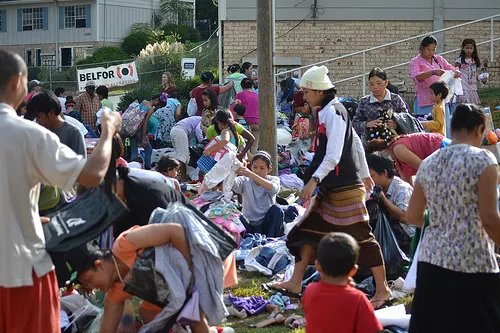A petite woman walks carefully around a cracked sidewalk, leaning against the weight of a toddler tied to her back with a single thin cloth. It's a damp, gray, 55 degrees outside, but mother and child are barefoot. A steady morning rain soaks their unseasonable clothes.
This isn't a scene from a developing country or the wake of a natural disaster. This is the courtyard of Birchcroft, an apartment complex on Central Avenue occupied mostly by refugees. The residents here have been among the hardest hit by the government shutdown - and those close to the community say that the shutdown's impact will linger far beyond the cutbacks and furloughs.
"While the two parties in Washington are bickering, these people are the collateral," says Mathew Rogers, an outreach coordinator with Renovatus Church who began working with Birchcroft residents in 2009. "They have shallow roots to begin with, and the shutdown could leave them scattered to the wind."

- Joe Tolley
- Birchcroft tenants sort clothes at a yard sale in front of the apartment complex.
Most of the refugees are from war-torn Nepal and Vietnam, and nearly all have children under the age of 5. For them, the N.C. Department of Health and Human Services' Oct. 8 decision to stop issuing benefits, including food and baby formula, tied to the Women, Infants and Children program was particularly problematic. North Carolina was the only state in which WIC benefits were disrupted by the shutdown, and by the time the announcement had been made Oct. 8, about 20 percent of recipients statewide had not yet received benefits for October.
The Department of Health and Human Services was able to re-open the WIC program by Oct. 11 with lapsed funds from the previous fiscal year and product rebates from baby formula manufacturer Nestle Foods. But its security remains shaky if the shutdown continues after the 31st (after lapsed funds run out).
Additionally, as part of the shutdown the department announced Oct. 14 the suspension of the federally funded Work First program, also known as Temporary Aid to Needy Families. Work First provides short-term cash, child care, food stamps and Medicaid to help families stay off welfare and is heavily utilized by the refugee community.
Short-term loss of programs like WIC and Work First cause Birchcroft refugees to lose ground that's difficult to recover when, says Rogers, "they're already hanging by a thread."
"A lot of us can process what it means when there's a hiccup because of the shutdown," says Stephen Jackson, a full-time missionary who moved into the Birchcroft apartments in 2010. "But for refugee families it's a huge challenge. They just don't see the money come through on their EBT card and they don't understand why."
Rogers points to the language barrier as a primary cause of confusion; first-generation immigrants rarely speak English and rely on young children to communicate for them.
Nonprofit organizations and charities were the only fallbacks for those who lost WIC vouchers and other federally funded aid; WIC recipients were referred to community food banks following the Oct. 8 suspension of benefits. Rogers and his wife continue to take groceries to Birchcroft families with babies and pregnant women who have "literally no food in the house," and Renovatus Church uses monetary donations to purchase Food Lion gift cards for residents in need, which they'll continue to do if and when the shutdown ends.
"It's devastating for most of these families to lose WIC vouchers even in the short term," says Meghan Murray, a volunteer who coordinates donation drives for Birchcroft. Murray's family supplies prenatal vitamins to pregnant women in the community. "We're worried about them because they have no other access to vitamins or nutritious food."
Confounding what Rogers calls the "tightening noose" of the government shutdown are tensions between the Birchcroft community and the property's management.
"You hear about an apartment complex that houses refugees and you think it must be a beautiful thing," says Murray. "But you get there and it's shocking. Things aren't safe, things aren't getting fixed."
Kimberly Walters, community manager for Birchcroft owner Lomax Properties, says the company works with agencies that help refugees get set up with housing after arriving in the United States. Rogers says Lomax receives subsidies that help pay residents' $650 rent for the first six months but not beyond. At that point the obligation to pay for rent is transferred to tenants. "That's not a lot of time to figure out your life," Roger says.
Birchcroft volunteers also question Lomax's use of subsidy and rent funds. A building within the apartment complex that burned after a fire in one of the homes last June remains barricaded and unrepaired. Walters says the delay is due to insurance claim issues.
"It can't take a year and a half to get an insurance settlement," says Rogers. "The money being taken from the government and from the residents certainly doesn't seem to be going back into the facilities."


